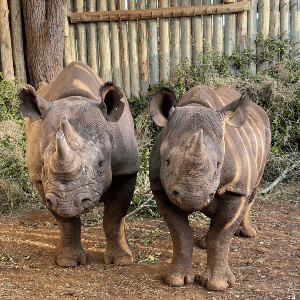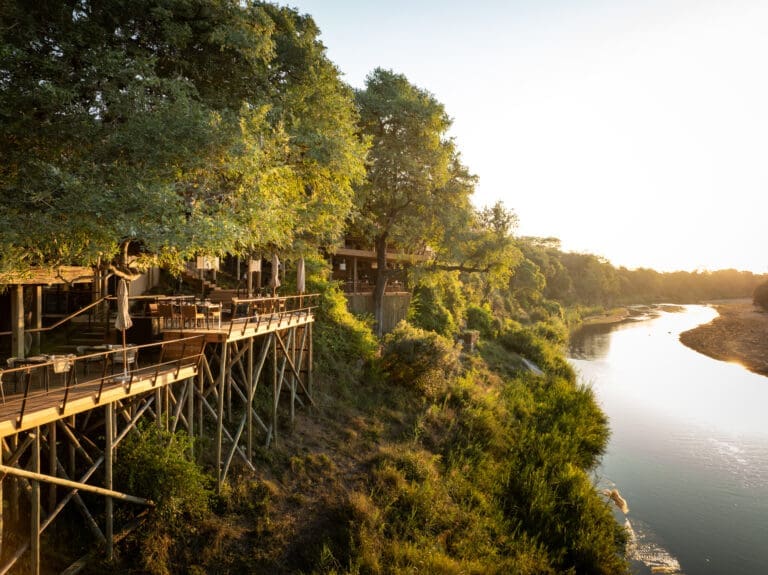 Critically endangered southern black rhino were recently relocated to Gonarezhou National Park (GNP) in the south-eastern region of Zimbabwe.
Critically endangered southern black rhino were recently relocated to Gonarezhou National Park (GNP) in the south-eastern region of Zimbabwe.
This groundbreaking relocation was conducted by the non-profit Malilangwe Trust, in partnership with the Gonarezhou Conservation Trust, and is another critical conservation intervention to re-establish a new viable population in the Park. A collaborative effort between private and public enterprises, it took over nine years to plan, and it’s an ambitious attempt to save the species from extinction in this region. The last black rhino was poached in GNP in 1994.
Fueled by lucrative illegal poaching, rhino populations in Gonarezhou NP have been decimated twice – between the 1930s and 1940s, and again in 1994. The relocation and protection of this founder population is therefore critical to the genetic diversity and future survival of the species, which is not only listed as Critically Endangered by the IUCN, but also a ‘specially protected species’ under the Parks and Wildlife Act in Zimbabwe. Reintroducing this megaherbivore to the landscape also restores part of the ecosystem and is based on extensive habitat assessments, and training of the security teams. There is immense domestic pride in re-establishing a new viable population in the national park, as Shangaan culture identifies a black rhino as a symbol of power and trust. The arrival of rhino in Gonarezhou NP also signifies a return of the Big Five – which is a major drawcard for ecotourism.
The rhino was carefully selected by age, social behaviour, and genetic composition, and are of extreme value to the existing gene pool. They were moved to Gonarezhou NP by road, under the expert care of wildlife veterinarians and ecologists, and remained in a holding boma for a few weeks to adjust before being successfully released into the wild, where they are tracked, monitored, and protected by anti-poaching scouts 24/7. Monitoring teams constantly use body scoring metrics to assess the success of adaptation to browsing, the new environment, and contact with dominant bulls.
Strong partnerships between non-profit trusts, like The Malilangwe Trust, government, national parks and local communities, are crucial for conservation in the future. Mark Saunders, Executive Director of The Malilangwe Trust, says, “We wanted this to be a major success for the long-term, which will take a huge amount of responsibility, but we are also excited to watch the process. It has always been our dream to be a reservoir of rhino to other areas to establish healthy breeding populations, and we knew we were part of something fantastic here.”
Singita’s high-volume, low-impact tourism model, pioneered 27 years ago, helps achieve conservation goals such as wildlife reintroductions. Attracting like-minded guests and donors who believe in Singita’s long-term conservation vision, along with sustainable ecotourism, is critical to protecting Africa’s most vulnerable species and landscapes. Since 1994, The Malilangwe Trust has been conserving 50,000 hectares of wildlife reserve comprising diverse ecosystems; protecting fauna and 19 free-ranging large mammal species; leveraging Malilangwe’s natural assets and human capital, to deliver a profitable and ecotourism model whilst delivering value to the neighbouring communities.
The far-reaching work that Singita supports through its independent not-for-profit funds and trusts has helped animal populations across four countries in Africa rebound and grow dramatically, turning these game reserves into the ultimate conservation success stories. Guests can support The Malilangwe Trust’s critically important conservation projects. To donate, click here
About The Malilangwe Trust
The Malilangwe Trust is a wholly Zimbabwean non-profit organisation dedicated to environmental conservation and committed to the development of lives in our local communities. Since 1994 it has been integrating conservation and community development by pioneering science-based protection and reintroduction of wildlife, alongside community programmes that educate and support future generations. www.malilangwe.org
About The Gonarezhou Conservation Trust (GCT)
Established in 2017, for the conservation and management of the Gonarezhou National Park (GNP), Zimbabwe’s second largest park. The Trust is an innovative conservation partnership founded by the Zimbabwe Parks and Wildlife Management Authority and the Frankfurt Zoological Society and mandated with the protection and development of the Gonarezhou National Park for 20 years. The focus of the GCT is on the ecological, social and economic sustainability of GNP and the role of the park in the Greater Limpopo Transfrontier Conservation Area.



















